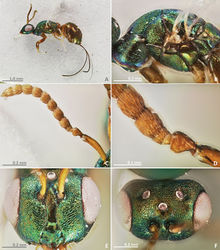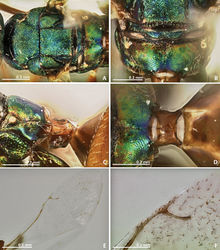Pseudidarnes kjellbergi
| Notice: | This page is derived from the original publication listed below, whose author(s) should always be credited. Further contributors may edit and improve the content of this page and, consequently, need to be credited as well (see page history). Any assessment of factual correctness requires a careful review of the original article as well as of subsequent contributions.
If you are uncertain whether your planned contribution is correct or not, we suggest that you use the associated discussion page instead of editing the page directly. This page should be cited as follows (rationale):
Citation formats to copy and paste
BibTeX: @article{Farache2014ZooKeys404, RIS/ Endnote: TY - JOUR Wikipedia/ Citizendium: <ref name="Farache2014ZooKeys404">{{Citation See also the citation download page at the journal. |
Ordo: Hymenoptera
Familia: Agaonidae
Genus: Pseudidarnes
Name
Pseudidarnes kjellbergi Farache & Rasplus sp. n. – Wikispecies link – ZooBank link – Pensoft Profile
Material examined
Holotype. ♀, AUSTRALIA: Kununarra:, -15.8319°, 128.8564°, 80m, 20.X.1997, Dixon, D., ex Ficus platypoda, n° PhD 455 (CBGP).
Paratype. ♀, same data as holotype (CBGP).
Diagnosis
Mesosoma metallic green. Mesosoma sculpture mostly reticulate. Median sulcus of the propodeum extending over the anterior half of the sclerite. Postmarginal vein shorter than the stigmal. Petiole transverse in dorsal view. Ovipositor sheaths longer than metasoma.
Description
Female. Body length 3.1 mm. Ovipositor sheaths length 2.4 mm. Metallic tinge present at least in some body regions. Predominantly green. Antenna yellow brown. Coxae brown. Femora and tibiae predominantly brown. Tarsi yellow. Petiole brown. Metasoma green brown.
Head. Antennae inserted at the middle line of compound eyes. Scape nearly 3 × as long as pedicel. Pedicel almost as long as wide, pyriform, and as long as first funicular segment. Anelli transverse. First funicular segment approximately as long as wide. Distal antennomeres forming a distinctive clava. Face sculpture reticulate. Face pilosity short and sparse. Supraclypeal area wide, its delimiting sulci not converging near epistomal groove, and its sculpture mostly smooth. Lateral ocelli nearly 1 × its diameter far from the eye margin.
Mesosoma. Pronotum short, nearly as long as high in lateral view. Mesoscutum strongly reticulate. Mesoscutellum reticulate. Frenal sulcus densely crenulated. Mesepimeron sculpture slightly reticulate ventrally, becoming smooth in its medial and upper region. Metascutellum as long as frenum, reticulate. Propodeum with a broad crenulated median line extending over the anterior half of the sclerite. Median line very faint or absent in the posterior half of the propodeum. Propodeum sculpture engraved reticulate. Wings hyaline, with sparse pilosity. Marginal and postmarginal vein not particularly widened. Postmarginal vein shorter than stigmal vein.
Metasoma. Petiole slightly rugose, and transverse in lateral view. Petiole dorsally without a longitudinal median sulcus Ovipositor sheaths long, distinctly protruding beyond metasomal apex. Ovipositor sheaths length 3.8 × hind tibia length, 0.7 × body length. Male. Unknown.
Etymology
The specific name is dedicated to our friend and colleague Dr. Finn Kjellberg, in recognition of his excellent work in fig wasps.
Biology
Reared from syconia of Ficus platypoda (Miq.) A. Cunn. ex Miq.
Original Description
- Farache, F; Rasplus, J; 2014: Revision of the Australasian genus Pseudidarnes Girault, 1927 (Hymenoptera, Agaonidae, Sycophaginae) ZooKeys, 404: 31-70. doi
Images
|

